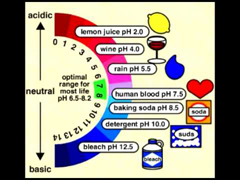Testimonials
Recipe of the Day
PH Levels and Healthy Beverages
 Our water (we call it our feedstock) comes from the Floridan aquifer within the Oklawaha Watershed situated in the north central part of the state near Ocala, Florida. The water is piped into Leesburg from a public water supply well. This water is tested by the Lake County Utility Department and you can obtain the water quality report on the Lake County website here.
Our water (we call it our feedstock) comes from the Floridan aquifer within the Oklawaha Watershed situated in the north central part of the state near Ocala, Florida. The water is piped into Leesburg from a public water supply well. This water is tested by the Lake County Utility Department and you can obtain the water quality report on the Lake County website here.
The feedstock water tests at a pH of 6.26, almost neutral. We purify the feedstock water using a multi-step purification process, which includes carbon and double-micron filtration, reverse osmosis, ozonation, deionization and UV sterilization. This approach removes all minerals, chemicals, organic and inorganic compounds, pharmaceuticals as well as bacteria and viruses. We then inject carbon dioxide into the purified water to carbonate it. Carbonation drops the pH and our Original Seltzer averages a pH of 4.0. A lower pH also inhibits biological growth. A pH reading at this level has no known negative health effects.
CARBONATION, PH IN BEVERAGES AND DENTAL HEALTH
According to the American Dental Association and the American Journal of Clinical Nutrition, the total acid level (titratable acid) is considered more important than pH level, because it will determine the actual H+ (positive ion of Hydrogen) available to interact with the tooth surface. Most soft drinks contain one or two common food acidulants – phosphoric acid and citric acid. Occasionally, other acidulants such as malic acid or tartaric acid are also used. SYFO contains none of these acidulants.
PH IN CARBONATED BEVERAGES AND BONE HEALTH
An American Journal of Clinical Nutrition article concluded that the intake of cola, but not of other carbonated soft drinks, is associated with a low bone mineral density in women. The article states: “A significant association of cola beverage consumption and increased risk of bone fractures has been recently reported among teenage girls and among female former athletes. An animal study has supported that heavy intake of cola soft drinks have the potential of reducing femoral mineral density. However, modest intake of carbonated beverages does not appear to have adverse effects on bone mineral density in older women. Potential mechanisms exist for the association between soft drink consumption and bone fractures or osteoporosis. First, the phosphorus content of soft drinks may limit calcium absorption and thus contribute to bone loss. Second, soft drink consumption may replace milk intake and indirectly influence bone mineral density.”

 "My family loves your product. I probably purchase 10 one-liter bottles every week! We us>I want to let you know that Syfo has been a real life saver for me. I decided to start a diet that was pretty tough for me, but once I discovered Syfo, it was simple to stick to my diet! Syfo helped satisfy any cravings that I had for sweets or soda! The Tangerine-Orange and Wild Cherry taste amazing! I just bought 20 more bottles!! Thank you Syfo so much!!!
"My family loves your product. I probably purchase 10 one-liter bottles every week! We us>I want to let you know that Syfo has been a real life saver for me. I decided to start a diet that was pretty tough for me, but once I discovered Syfo, it was simple to stick to my diet! Syfo helped satisfy any cravings that I had for sweets or soda! The Tangerine-Orange and Wild Cherry taste amazing! I just bought 20 more bottles!! Thank you Syfo so much!!!